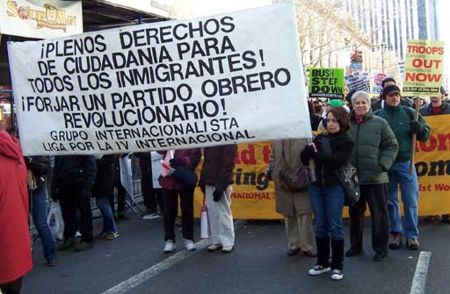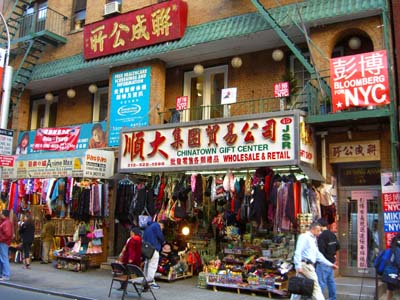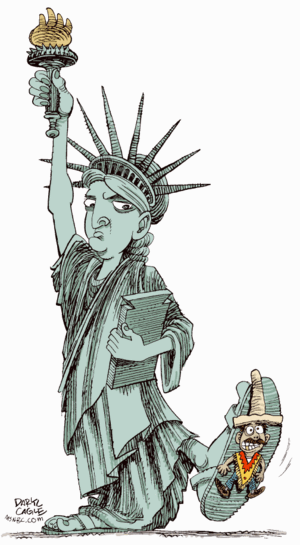Politics
From The Peopling of New York City

| ||||||||
|---|---|---|---|---|---|---|---|---|

| 
| 
| 
| 
| ||||
Contents |
Transnationalism
The necessity of political involvement for immigrants is foregone conclusion. However, an issue more recently debated is the impact of transnationalism on the political involvement/system and the assimilation of immigrants.
Transnationalism manifests itself in immigrants as national, political, and economic allegiance to both the United States and their country of origin. For many immigrant groups the impact of transnationalism is both positive and negative. Increasing political involvement while simultaneously perpetuating the existence of a cultural identity within immigrant groups. The phenomenon of transnationalism is not a new one and its effects can be seen in both the first and second great waves of immigration.
During the first great wave of immigration many Jews and Italians were heavily involved in the political climate of their home countries. These ties to home existed for many of the same reasons they remain to exist today. Firstly many immigrants intended to return to their country of origin before they even set foot in America. Secondly an oversaturated labor market and economic instability in the United States created an environment nurturing continued contact with immigrant’s home countries. Thirdly “(lack of) full acceptance in America plagued the earlier immigrants and may have fostered their continued involvement in and allegiance to their home societies.” (Foner 171) Finally, the abundance of transnational households, an institution most prevalent in the Italian immigrant population, created familial ties that crossed oceans and necessitated immigrant involvement in their home countries. Many men came to America alone in search of work to either send back to their families or fund their eventual immigration to America. Nearly 80% of Italian men immigrating into the United States between 1870 and 1910 left immediate family behind. The remittances of pioneer immigrants were substantial. Between 19000 and 1906 the United States Post Office sent 12.3 individual money orders to overseas countries. In addition to individuals ethnic organizations sent money overseas to their home countries. One landmanshaft, a Jewish homeowners association, sent large sums of money amounting in millions of dollars overseas to war torn Jewish communities. The organized sending of remittances was not an isolated instance. “ A writer in one Yiddish daily wrote: “The delegate has become, so to speak, an institution in the Jewish community. There is not a single landsmanshaft here in America … which has not sent, is not sending, or will not send a delegate with money and letters to the lanslayt (home country) on the other side of the ocean.”” (Foner 172)
In addition to the sending of remittances, many immigrants immigrate to America with the intention of just staying long enough to earn enough money to return to their home country and purchase land and a home. Additionally many immigrants would purchase homes and land in their home countries and then immigrate to America seeking a job so that they could send money home to pay the mortgage.
Additionally the intention of the eventual return home meant the “the maintenance of home ties and entails a continuing commitment to the norms, values, and aspirations of the home society.” (Foner 172) Although, once here, many immigrants eventually abandon their prospects for returning home, many did return. Between 1900- 1920 for every 100 arriving immigrants thirty-six left. This number should be an implication of the large number of immigrants that intended to return to their home country.Still, even without intentions of returning to their home countries, many immigrants remained politically involved in their home countries. Jewish and Italian immigrants read ethnic newspapers in Yiddish and Italian. The newspapers focused on the political and economic situations of their home countries.
The dominance of transnationalism was perpetuated and exacerbated by the technological advancements. More efficient steam ships, allowing safer and quicker passage across the Atlantic, the migratory practices of Italian laborers possible. Italian laborers would remain in America during the summer and spring during peak construction times, then, because of large numbers of lay-offs during the winter, would travel back to Italy to find other work and visit relatives.
The nature of transnationalism meant the increasingly role of Jewish and Italian immigrants in their home country’s politics. As a result many political candidates would travel to America seeking political and financial support for their campaign.
The second great wave of immigration has seen many of the same trends relating to nationalism that occurred in the first great wave of immigration. Now however, because of technology and globalization these trends are far greater in scale. The invention of the jet commercial airliner has meant that return to one’s country is both affordable and quick. Satellites and interconnectivity make contact with distant family members instantaneous. The Internet has made the transfer of media widespread and quick. Print media is made available in America the day of it publication half way around the world. As a result the importance of transnational ties is increasingly significant. Familial involvement across borders is now easy and efficient. Families can more easily leave members behind because of quick and effective contact via e-mail, phone, video tape, and web cams.
Economically immigrants are for more likely to invest themselves in foreign enterprises. Instant contact, quick and efficient international shipping, and even digital visual monitoring have made it feasible for immigrants to manage businesses thousands of miles away. An example cited in Foner’s book “From Ellis Island to JFK” is that of a Dominican man, after purchasing a garment factory in New York expanded his business by purchasing a garment factory in New York. Similarly many Chinese businessmen living in China purchase buildings and businesses in Chinatowns preceding their immigration to the United States.
Politically technological changes have manifested themselves in the heightened involvement of immigrants in the politics of their home countries. Dominican immigrants have been particularly involved in the political climate of their home country. Dominicans both in the United States created economic parties that exist in both the Dominican public and the United States. They aim for reciprocal benefit. Overall most Dominicans have come to the consensus that Dominican immigrants should nationalize, becoming voting citizens and, in turn, bringing political attention to the plight of Dominicans in the United States and Overseas. (Pessar and Graham 258) Guillermo Linares, knowing the importance of foreign political support, held rallies in the Dominican Republic, to gain monetary support and ethnic support from Dominican immigrants. (Foner 180)
Mirroring the increasing importance of transnational politics has been the increasing importance of dual nationality rights. In the Dominican Republic the Dominican government formed the Committee on Affairs of Dominicans Living abroad. Simultaneously New York entrepreneurs began lobbying for dual nationality rights in the United States. (Pessar and Graham 259) As a result of such efforts Dominican political reforms intended to go into effect in 2002 allow Dominican immigrants to vote in Dominican elections from polling places in New York. As a result Dominican political candidate will forced to campaign in the United States to Dominican immigrants, a sure sign of the increasing globalization of politics.
As the facts involving the increasing transnationalism during the Second Great Wave of Immigration emerge, it becomes apparent that transnationalism has done far more good then bad for the United State’s immigrant population. Transnationalism makes many resources available to new immigrants in New York. Transnationalism helps immigrants “cope with discrimination and prejudice…access a wide range of investment opportunities, political and organizational leadership positions, and assistance with child care.” (Foner 186) Most importantly transnationalism leaves immigrants options open, furthering their ability to adapt to the challenges of immigrant life. Although transnationalism may divert the political and economic attention of immigrants away from American issues, it does help immigrants gain a foothold in America, increasing the chances of success for future generations.
Political Involvement
The political machines that the Dominican community encountered were not those like Tammany Hall but in the form of school board communities and localized politics. At first, no attention was paid to the invisible immigrants as they were not politically active and had no significant representative for the community. As the offsprings of the original Dominican immigrants gradually became more entrenched in the United States culture and the socioeconomic environment of the Dominican Republic further deteriorated, all thoughts of returning to their homeland slowly decreased. The community then concentrated on establishing more permanent roots in New York City through taking advantage of reform movements that took place to encourage more minority political involvement and becoming more involved through local politics. By first fighting their way onto the local school board that was dominated by Jewish office holders in a predominantly Dominican district, they were able to first help address the growing needs of the community by approving programs such as bilingual classes. At the same time, several key political figures of the community were able to win political office to represent the predominantly Dominican neighborhood of Washington Heights. Part of the success can be attributed to a trait mentioned in Plunkitt of Tammany Hall where he attributes a local politician’s success to being able to address the needs of his community and fight for the interest of his constituents. The formation of grassroots community groups and establishment of an ethic enclave has helped the community become more active as a whole.The Dominicans have also have made themselves known outside of their communities through the arts. In Patricia Pessar’s chapter “Dominicans: Transnational Identities and Local Politics” in Nancy Foner’s New Immigrants in New York, she says, “Struggles over representation are also being waged within the contexts of literature, visual arts, performing arts, and music. Advances have been made in recent years as Dominican authors Julia Alvarez and Junot Díaz have managed to reach wide audiences through their novels, poetry, and short stories” (265). The Dominicans have used this as a means of getting their opinions heard in communities outside their own. Therefore, they have been very successful in becoming politically involved.
The Chinese community on the other hand, when compared to the Dominicans, is not as involved politically. This equates to no parental involvement or input on the local school boards and little attention paid to the special needs of children of the Chinese immigrants on a city-wide level. This in turn, has resulted in few resources available for schools in predominately Chinese areas such as Chinatown. The dilapidated state of these schools and scarcity of after-school programs due to funding, has led to an increase in unlawful youth activities such as gangs.
There is a very definitive reason for this disparity in political involvement, which stems from these groups’ desires to assimilate (or not assimilate) into the mainstream American society. Since the first wave of Chinese immigration, most have tended to stay in ethnic enclaves in which they have their own private society, separate from that of the rest of the country. They generally do not learn English unless forced to do so, and have their own economic system within the enclave.
Because the second generation Chinese do usually move away from this system, the Chinese community, while still generally closed off, has gradually embraced some city politics. There are still enough who stay and many have continued to take comfort in the closeness of ethnic enclaves and have rarely attempted to get involved in outside politics. It seems that the people of Chinese enclaves often feel such an obligation to their people that they do not wish to get involved in any politics outside of their own sector of society. Therefore, they tend not to be properly represented when it comes to government and outside decisions.When comparing the two ethnic groups, a correlation between political involvement and quality of education can be seen. In order to improve the quality of education for an enclave’s local schools, that ethnic group must have representation on political entities such as school boards to champion for the group’s special needs. It is also important to note that the level of an ethnic group’s political involvement in the United States can be predicted by examining the political nature of their homeland. The Dominicans, for example, come from a society dominated by political factions, which explains their very active involvement in the politics in the US. The Dominicans over the years have felt a certain obligation to become involved in politics and the decisions made which may affect their group. The Chinese, on the other hand, stem from a place where political power lies with a select number of government officials and political activity is heavily censored. Political involvement is not as emphasized as in the Dominican community. This, along with a lack of free time and the language barrier, explains why the Chinese are generally uninvolved with politics on a local level.
Effects of Political Involvement: Past and Present
Until the 60’s Dominicans were a small group who were seen as unlikely to vote, and thus were largely overlooked politically. However, Dominicans were organizing many of their parties (from the Dominican Republic) in NY to avoid political unrest. In the 80’s they gained control of district 6 and became influential enough to gain bilingual education for Dominican immigrants. The 80’s also saw redrawing of district to provide a greater voice for under represented minorities. Further redistricting in 1992 further increased their political say. Dominicans began wining elected offices. Dominicans decided that the best way to help their home country was to gain US citizenship to gain support and awareness for their cause. To persuade Dominicans to do this, the Dominican constitution was amended in 1994, allowing Dominicans to regain citizenship. By 2000 Dominicans living outside the country were permitted to vote in elections. Recently Dominicans began spreading to other parts of the country leading Dominican positions to change their focus to that of Dominicans all over the country. However, Dominicans feel that despite all this they are still under represented. Dominicans are still not represented proportionally to their population size. There has been an increase in Dominican media influence through authors and music. The Dominican story has lead many to realize that it is possible for one to integrate with American society wile still remaining politically attached to their own society.
As opposed to Dominican political involvement, the Chinese are less involved politically and thus the Chinatown government does little to stop the tongs, claiming that they do all they can but people don’t report crimes. The people claim that the police are unable to convict the gang members. In 1984 a politician claimed he would eradicate gambling parlors, cutting off gang funding. There were raids, yet a few months later everything was back to normal. Many feel that police are taking bribes and informing gambling parlors of raids. For this reason people fear reporting crimes, as they do not want possible repercussions. In 1985 25 members of the Ghost Shadow gang were arrested for charges dating back to 1971, leading to the gang to disband. Many questioned why it took so long to make the arrests for crimes committed so long ago. This was the First time a Chinese gang was persecuted by federal courts. However gang violence has escalated with gang wars between the tongs and gangs they started that are now working for themselves. To shut down the tongs would take cooperation on a federal, state, and local level. Yet this isn’t happening as there is not enough public interest.
The lack of public cooperation is seen especially in cases involving Chinese gangs, where people refuse to cooperate with outside authorities, even when it involves their own safety. In Peter Kwong’s The New Chinatown, he says:The problem lies with Chinatown residents who are not cooperating. The authorities complain that the Chinese do not report crimes, even when they are victims. On May 19, 1985, during lunch hour, a group of young gang members pursuing another gang rushed into a busy restaurant and started shooting. Seven people were wounded, a four-year-old boy and a white customer among them. Hundreds saw the incident, yet no witness came forward. (125)
The Chinatown planning Council was created in the 60’s and uses government funding to create short term programs for china town (ie day care etc). Its only power is to request funding, and is there fore controlled by federal agencies. They use political contacts with politicians, helping them get support in exchange for funding. However, due to this the CPC can be used as a political tool that often goes against residences of China Town. Since they supported mayor Koch (who was pro gentrification) they did not support protest groups. Their members at times can be corrupt and self interested. The Chinese are suspicious of the CPC and although having political influence it is in large part a failure.
The only way for China Town to fix its problems it to first develops a grass roots organization. However, such groups are often ostracized and eliminated by traditional associations. In the 70’s there was a strong socialist movement in Chinatown. Such socialist programs provided medicair, legal assistance, and handling housing complains as a means of spreading their ideas of social revolution. They organized militant attacks against racism and mobilized the community. However, these groups had ideological trouble it that they had no clear causes and often disagreed on many issues. This kept them from becoming strong enough to challenge the tongs. By the mid 70’s groups were being organized to help workers, dealing mostly with issues of civil right. But like in the past, these less radical groups were fighting for, not with the people. The Chinese left broadened its view to include more people. There are not many Chinese registered to vote, and thus ethnic issues are over looked.
Mexicans, much like the Chinese also suffer from lack of political involvement. Some Mexicans succeed and some don’t lead to long-term negative consequences on their group’s collective success this is made worse by a lack of political mobilization. Like the Chinese, a main reason for lack of political involvement is the fact that a large percentage of Mexicans are undocumented and thus can’t vote.
Work and Political Involvement
Further information: Work
The effects of work on politics (and vice-versa) have been prevalent throughout New York City's History. During the height of power for New York's Labor Unions, specifically the post-World War II era, nearly every vocation involving labor: manufacturing, service, and even managerial occupations, was represented by some type of labor union or equivalent social institution. The organizational structure and militant solidarity found in those unions enabled them to act as springboards for political activism. Nowhere was this more obvious than in the struggles immigrant groups have had to deal with over the decades in order to organize as a working class and gain a powerful voice in deciding the city's economic and political policies.
Immigrant Politics Today
As the various immigrants are slowly developing roots in their homes, they are faced with yet another obstacle, the struggle to gain acceptance and equality into mainstream politics. Despite tremendous efforts and obvious gains of politicians whose roots lie with various enclaves, the immigrant voice in politics is still disproportionate to the immigrant population itself. The question remains, what can immigrants do and how far must they bend to finally be able to achieve and live the American political ideal?



